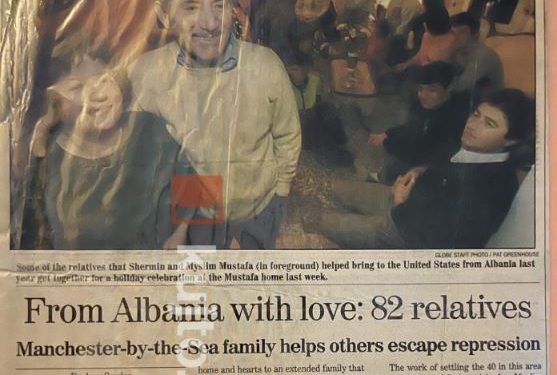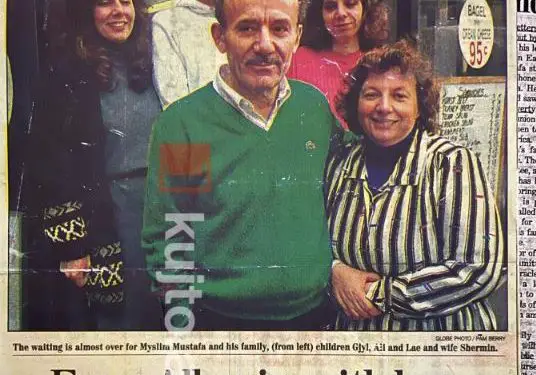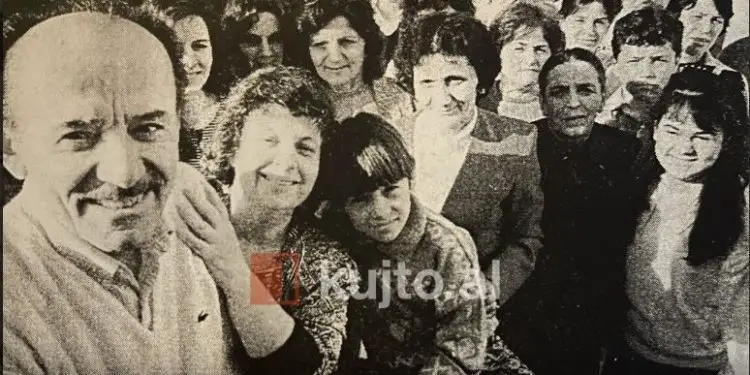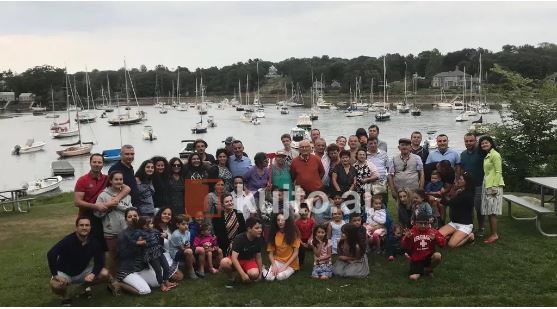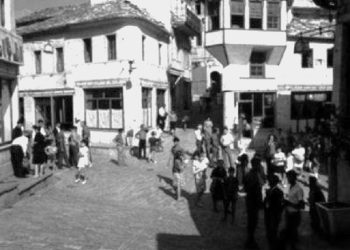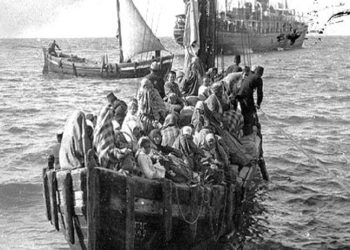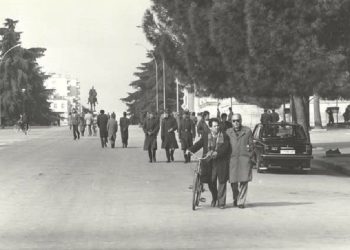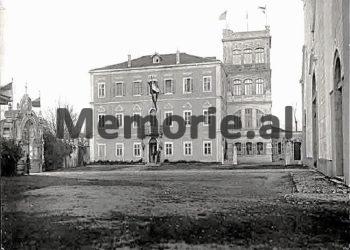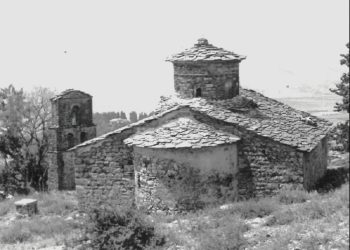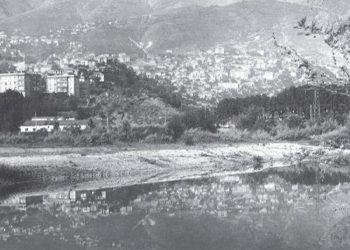By Rozi Theohari
Second part
Memorie.al / From Greece, he went to the United States of America, where and why he created a family, settled down and lived freely, he could not be happy because he had no contact with his family in Albania. An anxiety that lasted for 36 years, until they met again. A year later, Muslim Mustafa managed to bring his entire large family, with a total of 82 people, to the United States, who managed to start a new life. Today, after 35 years of family reunification, in the USA, with the help of Mysli, about 170 members of the tribe have arrived.
Continues from the previous issue
Musliu arrived in New York on March 1, 1956… He was 25 years old and did not know a word of English. The next day he got a job at Schrafft’s restaurant on 34th Street, across from the Empire State Building.
Although happy that he now had a job, Musliu did not want to remain a restaurant waiter. Not knowing the language put the boy in difficulty, how many times he was ordered to; “bus boy”. Every day, at 3 o’clock in the afternoon, when the customers left, the lady of the restaurant would give Musli a stick with a nail on the top and order him to pick up the pieces of paper that had fallen on the floor.
“For me,” says Musliu, “I was ashamed and sweaty to do the cleaning.” I was used to hard work, menial work, but not to do that kind of work”!
With the help of a friend, Musliu left New York and settled in the state of Connecticut (Connecticut), in the city of Bridgeport, where he found work in his profession, in the car assembly plant at “International
Harvest”. He worked in the factory for six years while attending night school to learn English. There were six single boys, Albanians and Kosovars, who worked and lived together, like brothers.
“We remembered our families, separated for years and without receiving any news, – says Musliu, – we hoped, wished, dreamed that Albania and Kosovo would open up and become democratic countries like America and other European countries. But over time we saw that our hopes were in vain. In New York, the “Free Albania” Committee was operating with Hasan Dostin as its chairman.
They invited us every year to celebrate the November holidays in New York. We used to hang out with the crazy guys who worked in Connecticut.” Musliu stayed six years in Connecticut, from 1956 to 1961. The factory and the school became an integral part of everyday life.
The bride from Istanbul
In 1962, Musliu himself the fourth, with his friends, went to find a bride in Istanbul. One of them, of Albanian-Turkish origin, proposed to Musli to be engaged to his cousin, Sharmin, an honest girl from an honorable Albanian family.
“I met Sharmini and her family at the five-star Hilton hotel,” says Musliu, “but for me it became a six-star hotel, because my Sharmini was more than a star, not only in appearance, but also from the kindness and compassion he showed for me, the only boy from Albania…! She also replaced the love of my mother and sisters, which I missed…”!
After he got married and spent two months in Turkey, Musli couldn’t wait to return to America, find a job and earn money, to open a new house. From Istanbul, in 1962, Musliu came straight to Boston, where thanks to the support and care of the Albanian patriot, Anton Athanas, he was accepted to work at the restaurant “Pier 4”, and later at Athanas’s other restaurant; “General Glover’s”, in Sampscot, where he worked as a bar manager of the restaurant.
Musliu interrupted the conversation, brushed his white mustache with his hand and laughed under his breath. He remembered the letters he used to send to Sharmini in Istanbul, which he wrote on the bar counter of Athanas. “Instead of showing my love and longing for my husband,” he joked, “I wrote to him that I was saving money, as much as I could, that I ate only bread and butter every day, to collect the money we needed, for the new life that was waiting for us…! I put the money little by little…! I prepared the ‘cards’ for Sharmini’s arrival and sent them…”!
The hearth of the family
I asked Sharmini about her impressions when she first came to America. – “Musliu had rented an apartment in Peabody, Mass.,” she said. – He wrote to me in the letter that the apartment had two rooms. The apartment told me that, when I came from the airport, Musliu opened the door and went straight into the kitchen.
From the kitchen you went straight to the only room. This was our first apartment. I didn’t know English well, I knew French, but it didn’t work for me. We didn’t know each other well with Musliu either. I felt loneliness and longing for the family I left behind in Turkey.
Musli’s irregular work schedule added to my loneliness. He left home at half past three in the afternoon. He started work at four o’clock, at the bar of Athanas’s restaurant, and returned in the morning. I cried all night…”! But, according to her story, the children came next, Gjyli, the eldest daughter, Lale, the second daughter and Ali, the only son.
In a family of five, no one could be called lonely. “Our conjugal love, – continued Sharmini, – was added to the joy of raising and educating our children. Musliu set a firm rule in the family: inside the house, we would all speak Albanian. This lifestyle forced our children to learn and respect the language and traditions of the Albanian family”!
With the money earned and stored with care and hospitality, in 1971, the Mustafa couple opened a new business, the “Oceanside” restaurant in the village of Magnolia, Mass. Husband and wife, worked together with five waiters, in the restaurant with 120 seats. Musliu, who had worked for a long time in restaurants, had gained a good experience for this type of business. Thus, increasing profits year after year, they sold the restaurant five years later and bought “Earnie’s Coffee Shop”, in Government Center, in Boston, in 1976.
Voice of Hope
For 36 consecutive years, Musliu tried to communicate with his family in Albania, sending letters to the family, not being sure if they received them or not (Local American newspapers that have described the family’s history, add that the letters that came to Mr. Mysliut from Albania, had whole parts covered in black by censorship).
Knowing how much the family suffered from scarcity and poverty in Albania, since they had no means to face the difficulties of life, the Mustafa couple used the way of sending packages: they sent six boxes of sewing machines to Albania.
Coincidentally, the receipt from the store, which was stuck on the sewing machine box, also had the phone number of the Mustafa family in Manchester written on it. In September 1990, at Musliu’s house, the phone rang and, for the first time, after 36 years, he heard his sister’s voice. “She was a child when I left home,” sighed Musliu, “she was 14 years old.”
The sister’s voice, as if it were an angelic voice, coming from the sky, once again renewed Musli’s childhood memories. That sister’s voice symbolized the soft voice of the grandmother, the caressing hand of the mother, the concern of the brothers, the love and impatience of the grandchildren to know the lost uncle… and this range of emotions led him to a decision: to leave as soon as possible to birthplace
He collected his mind and in November 1990, decided to leave together with Sharmini, although friends and authorities advised him not to rush, because he might suffer. After securing a special “investor” visa, they both boarded the plane. Musliu and Sharmini arrived in Tirana on Thanksgiving day. The Mustafa couple was received at Rinas airport by their cousin, Zagolli, who had been in prison for 12 years, since he was 21 years old, convicted because of his biography as a ballistic missile.
When he met the family, instead of being happy, Musliu was more worried, when he saw how his brothers and sisters and all his relatives, who didn’t have a coat to protect themselves from the winter cold, were frozen. Added to this despair was the great pain felt by the unfortunate refugee when he did not find his mother alive.
She had died a year ago, with her face always turned towards the door, waiting for any news about her exiled son…! “We went to his grave,” says Musliu, “I mourned him…, I touched his tombstone…! I heard the moaning of the mother…, her suffering, year after year…! They are bitter memories…”, he concluded.
When the Mustafa couple returned to the US, the first thing they did was collect a ton of clothes for different ages and body sizes and send them to the family’s address in Albania.
Former fugitive reunites with family
For Musli Mustafa and his family, the year 1992 has been a tiring year, full of emotions, worries and joys, a year that fulfilled the 36-year-old dream of former fugitives to join other family members . No more and no less, but 82 members of the extended Mustafaraj tribe traveled to America: Musli’s three brothers and two sisters with their families, as well as all first cousins, from the mother and father. In this gathering of relatives, there were old men and women, men, women, grandchildren, even pregnant brides…! How did it happen?
With his interest, Musliu got in touch with the agency “The International Rescue Committee”, an international refugee organization, which helps to reunite families scattered around the world. This agency gave the tribe of 82 people the opportunity to travel to America in 1992. The organization paid for the passengers’ tickets, with the condition that, in the future, they would all repay their value, little by little.
Sharmini and Musliu, on the day they celebrated their 30th wedding anniversary, open the doors of their home and heart to receive a whole detachment of relatives under their patronage and protection. They all arrived sometime between March and May 1992. Among them, the 42 most distant members were dispersed to Baltimore and New York, while the 40 nearest, including the families of brothers and sisters, took place, originally in Manchester-by-the-sea, Mass.
Sharmini and Musliu, in March 1992, made the necessary preparations to receive the first 13 guests. A few weeks before their arrival, the Mustafa couple brought mattresses, pillows and decks to their five-room house. On the floor of the living room, five mattresses were placed for the little nieces…, the others slept in the rooms…!
Gjyli Mustafa – Kozlu, the first daughter of Musliu, she and her sister and brother helped as much as they could. Gjyli tells what a surprise and joy it was to meet all those cousins. She had never seen her father so agile and happy…! She now accepted her father’s insistence once, to learn Albanian, which now came into her work, more than ever. She calls it a privilege to be able to communicate in her parents’ language.
The doors of hospitality
With 40 guests coming to his residence, Musli now needed a “full-time job”, while his son, Ali, replaced his father in his restaurant “Ernie’s Coffee Shop”, in Boston. Musliu took all his time, finding residential apartments, equipping and furnishing them, also attending “garage sales”, finding jobs for men and women, enrolling children in schools, accompanying the doctor and the dentist…!
“They are all employed today, – says Musliu with satisfaction, – because my relatives were used to all kinds of physical work, their hands were thick with calluses…! That’s how they were quickly hired in places of work, that anyone else would close their lips. Women agreed to work as house cleaners and babysitters in wealthy families everywhere in the small towns around.
Musliu is proud of his relatives, who, wherever they work, are praised by bosses and managers. Parents work two or three jobs, making sacrifices to send their children to school and college. As early as the first months of the children’s enrollment in schools, they were distinguished for academic progress and exemplary behavior, which attracted the attention of the local press.
Articles were published with interviews of teachers and school principals, with the best words for the students of the Mustafa families. But at the same time, articles were also published that pointed out the praiseworthy work of Musliu and Sharmini, to welcome them with a good heart and to guide people of their kind and blood in life.
“Today they are all employed and have bought houses, – Musliu is proud, – they have learned the language…, the children have grown up and finished college… but still, every now and then, some problem or concern arises, which I take care of .
Musliu and Sharmini will never forget the day of March 12, 1992, when the first 13 members of the family arrived at their home and lived for some time in the white house, Mustafa, on Pine-street. “That night, – says Musliu, – no one blinked. We stayed up until 4 in the morning, talking and making out. Even to this day, – he adds, – we continue to remember year after year, every event that happened, that has left scars, wounds and sadness in our crippled lives”.
Due to the continuous political persecution of the Mustafaraj family, driving them from the city to the remote villages, Musli’s extended family of 12 members was forced to live in a straw hut, where what fell outside, flowed inside. They took away their lands and what property they had.
“This family reunion was my dream, now it has come true…! This is incredible…, it’s like being born again…! It is a late union… but, however, it is true…” – says Musliu, in an interview given to a Manchester newspaper.
Towards new roads
Musliu came to America in 1956, with no money in his pocket, except for the strong arms of the worker. Tok and his wife, worked in the successful restaurant business, raised three children, who studied in colleges: Gjyli, the eldest daughter, is a psychologist, Lale, the second daughter, is a teacher and Aliu is a doctor, married to a doctor from Tirana . Today, Sharmini and Musliu are happy grandparents, enjoying two granddaughters and a small grandson, who fill their home with light.
When Musliu brought his big family from Albania, he wanted the young boys and girls who just arrived full of energy and desire to grow up educated and educated like his children, “stealing” a piece of the American dream. And it really happened.
It is enough to listen to the testimony of one of Musliu’s brothers, Astri Mustafa, who is Musliu’s younger brother, who says that in 1962, their family: three brothers, two sisters and mother, were exiled from Fieri to Golem. of Gjirokastra.
They all worked in the agricultural cooperative, on the lands that had once been their property. They worked and lived like animals, in a hut made of straw and sticks, without water or electricity. Astrit has a big worry: when he finished high school, although with very good grades, he was not given the right to study, because of his “black” biography. – “I will keep this worry for the rest of my life, as the greatest sadness”, he says. But the history of schools continues.
Astriti and Myhyrja, his wife, had four children, three boys and one girl, who were the first in the 8-year school. The first son, Neritan Mustafaraj, finished the eight-year school brilliantly, but a year later, they barely gave him the right to continue the Agricultural School in Libohova. In the second year of school, Neritani took part in the national chemistry competition in Durrës in 1989 and won second place. When Musliu moved his family to America, it was also lucky for the children, who would be educated according to their abilities and desires.
Now, Astriti, the non-realization of his dream, he sees fulfilled in the children, who today are no longer children, but specialized and professionalized persons, in different fields. Neritani, at work during the day, at school at night, in North Shore Comm. College, successfully completed English language studies and chemistry courses, to later continue to university, where he graduated as a chemical engineer. He has been working for a company in Milford, Mass. for 6 years. and today serves as chief engineer. Now he is continuing his studies, finishing his Master’s Degree in business.
Mentor, the second son, finished high school in Manchester, and later finished university, where he graduated in anthropology. He received his master’s degree from the University of Arizona and is now pursuing a master’s degree in education at Salem College. He continues his studies for a doctorate in anthropology. Sorkadhi, the third son, graduated from high school in Salem, Mass. In addition to studies, he is also involved in the sport of wrestling. He won first place in the Massachusetts high school competition.
While in the Hartford competition, in Connecticut, it won third place among high schools in New England. For these achievements, Sorkadhi has been written about several times in Salem and New England newspapers. Sorkadhi started Boston University, but in 1999, he left school and, of his own volition, engaged in the movement to help Kosovo. He served in Kosovo for three years as a translator for the US Army. After returning from Kosovo, Sorkadhi graduated from the university for “accounting” and today works in the same profession.
He is a distinguished activist in the Albanian diaspora of Massachusetts. Denisa, the only sister among three brothers, graduated from Boston University in Biology and today works at the “Jensai” company in Boston. I asked Astrit; how they managed to study all four children in universities. “They won scholarships” – he said – because they were excellent in studies… otherwise, we, as a family, could never help them…”!
Astriti and his wife managed to get an education as well, completing two years of North Shore College to study English. Both in Astrit’s family, as well as in the families of other sisters and brothers, as well as in Musli’s relatives, across America, those children who once came with the curiosity and wonder of the young, today have graduated from universities and are employed everywhere in Massachusetts e, across the new continent. And Musli’s heart sings and he is proud of the skills, education and energy of the people of his tribe. Memorie.al




